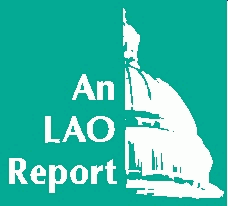
 |
LAO Recommended Legislation |
Authorize the transfer of the Department of Conservation's (DOC's) beverage container recycling program to the Integrated Waste Management Board (IWMB).
The IWMB is responsible for most of the state's waste recycling programs. The DOC, however, administers the beverage container recycling program, which promotes the recycling of certain types of beverage containers.
Transferring the beverage container recycling program to IWMB would result in some administrative cost savings (probably in the range of $100,000 per year). Perhaps more importantly, merging these programs would improve the integration and coordination of the state's recycling efforts, thus increasing their effectiveness.
Please see our 1993-94 Analysis, pages B-36 and B-37.
Steve Boilard: 445-5921
Require that property owners who directly benefit from fire protection services of the California Department of Forestry and Fire Protection (CDFFP) partially offset the costs of that service by paying a fee or fire insurance surcharge.
The CDFFP provides fire protection services in state responsibility areas (SRAs). Property owners in SRAs benefit directly from CDFFP's services. Thus, they ought to share in the cost of those services through user fees.
User fees are typically levied by departments to finance programs where an identifiable group benefits, such as the Department of Parks and Recreation's camping and day use fees and the Department of Fish and Game's hunting and fishing licenses. However, such fees are not currently charged for fire protection services provided by CDFFP in SRAs.
Please see our 1993-94 Analysis, page B-43.
Miriam Ingenito: 445-5921
Reauthorize the state Superfund program, which sunsets in January 1999, and make changes that will reduce cleanup delays and the abandonment of contaminated properties.
The Legislature could expedite site cleanups and promote the redevelopment of abandoned or idle contaminated properties by making various changes to the current Superfund law. For example, litigation-related delays associated with allocating liability for cleanup costs could be reduced by providing for state funding at "orphan share" sites, liability protection for prospective site purchasers, and expedited settlements for modest contributors to the contamination. Cleanups could also be expedited by (1) providing greater legislative direction regarding cleanup standards in order to facilitate regulatory compliance and promote greater consistency statewide in the application of the standards and (2) providing authority for land-use-based cleanups.
Please see State Superfund Reauthorization: Expediting Hazardous Substance Site Cleanups, August 17, 1998.
Mark Newton: 445-5921
Require fees to fully cover costs of (1) environmental regulatory programs designed to prevent or reduce pollution and (2) programs for the cleanup and restoration of polluted properties and natural resources.
Private parties that benefit from using public resources should be responsible for paying the costs imposed on society to regulate such activities. Environmental regulatory programs currently exempted from paying fees include the Air Resources Board's stationary source program; the State Water Resources Control Board's (SWRCB) core water quality regulatory and water rights programs; the Department of Toxic Substances Control's transportation-related emergency response program and the review of timber harvest plans by the Department of Forestry and Fire Protection and SWRCB.
Please see our 1992-93 Analysis, page IV-19 (financing of resources and environmental programs).
Also see our 1993-94 Analysis, pages B-44 and B-69, page B-59, and page B-65; 1997-98 Analysis, page B-85.
Mark Newton: 445-5921
Make various changes to the California Environmental Quality Act (CEQA) so that the CEQA review process works better to achieve the statute's goals.
The CEQA's ability to inform public decision-makers and the public about the environmental impacts of development can be increased, and compliance costs to the business community can be reduced, if the CEQA process is made more efficient. This can be done by (1) clarifying a number of statutory requirements, (2) expanding streamlining measures to avoid duplication of environmental review, (3) making local CEQA policies more certain by enhancing public access to these policies, and (4) requiring mitigation measures to be based on statewide goals.
Please see our CEQA: Making It Work Better, March 20, 1997.
Mark Newton: 445-5921